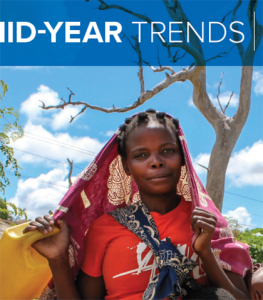Refugee and displaced numbers continue to rise – UNHCR
The number of displaced people around the world increased to more than 84 million in the first half of this year, according to a new UN report.
The UN refugee agency UNHCR says the rise in people forced to abandon their homes was fuelled mostly by conflicts in Africa. It says the number of displaced people — most of them within their own countries — was up from 82.4 million at the end of 2020.
It says the number of displaced people — most of them within their own countries — was up from 82.4 million at the end of 2020.
“The international community is failing to prevent violence, persecution and human rights violations, which continue to drive people from their homes,” said UNHCR head, Filippo Grandi, in a statement.
“In addition, the effects of climate change are exacerbating existing vulnerabilities in many areas hosting the forcibly displaced,” he said.
The UNHCR report found that the number of people classed as refugees under its mandate was more than 20.8 million halfway through the year — an increase of 172,000 from the end of last year. The number of asylum-seekers stood at 4.4 million, an increase of 237,000.
“Although comparable figures for internal displacement are not yet available, based on the information at hand UNHCR estimates that global forced displacement likely exceeded 84 million by mid-2021,” the report said.
Around 1.1 million people returned to their areas or countries of origin in the year’s first half.
UNHCR said that over 4.3 million new internal displacements were recorded between January and June in 33 countries where it is monitoring the displacement situation.
It said that was a sharp increase from a year earlier and that intensifying violence led to “significant” displacement in Congo, Ethiopia, Afghanistan, Mozambique, Myanmar, South Sudan and countries in West Africa’s Sahel region.
UNHCR said its figures came from governments and its own offices around the world and were supplemented by data from non-governmental organisations.
Around 3.9 million Venezuelans were also displaced beyond their borders without being considered refugees, while 4.4 million people were registered worldwide as asylum seekers.
While those numbers marked small hikes, most of the increase in global displacement seen during the first half of the year was due to people fleeing inside their countries, especially in Africa, UNHCR said.
More than 4.3 million people were estimated to have become newly internally displaced across dozens of countries between January and June, 50 percent more than during the first half of 2020, the report showed.
Intensifying violence in the Democratic Republic of Congo and Ethiopia, with its escalating conflict in Tigray, forced more than one million people to flee internally in each of those countries.
Active conflicts and violence also pushed up internal displacement in places like Myanmar, Afghanistan, Mozambique and South Sudan, UNHCR said.
Meanwhile, fewer than one million internally displaced people were able to return home during the first half of 2021, leaving a full 51 million worldwide living in internal displacement at the end of June, up from 48 million six months earlier.
The vast majority of refugees are hosted in countries neighbouring crisis areas, mainly in poorer parts of the world, while IDPs often find accommodation in already struggling communities.
In its mid-year trends report, the agency warned that many of those fleeing their homes were facing additional challenges due to COVID-19, extreme weather and other effects of climate change.
See the full report here: https://www.unhcr.org/search?comid=56b086754&cid=49aea93aba&scid=49aea93a5c&tags=midyear












